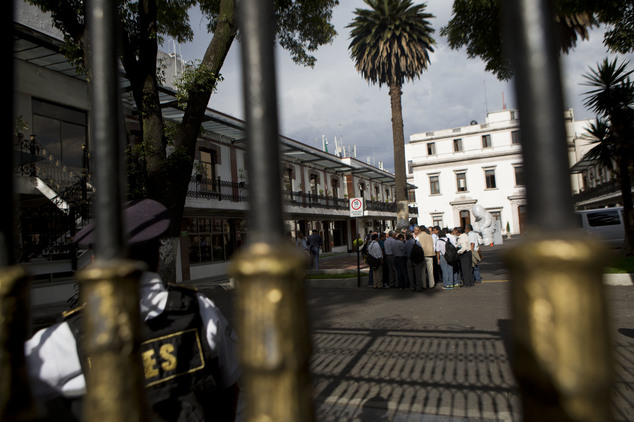MEXICO CITY (AP) — Leaders of a radical teachers union met with Mexican government representatives late Wednesday June 22 to try to defuse tensions after eight people died in clashes in the southern state of Oaxaca, but managed only to schedule another meeting for Monday.
Roadblocks on highways around the southern state of Oaxaca that have frozen commercial traffic for more than a week continued Thursday June 23. Leaders of the National Coordinator of Education Workers, or CNTE, hailed the accomplishment of bringing the government to the table after months of refusals.
But following the five-hour meeting in Mexico City, Interior Secretary Miguel Angel Osorio Chong said in a statement that he made clear that the reforms were law that the government had to carry out. He left open the possibility of compromise on other demands that would not affect the reforms.

Protesting teachers, accompanied by a mediation commission, huddle together in discussion inside the courtyard of the Interior Ministry, as they await the start of a meeting with Secretary of the Interior Miguel Angel Osorio Chong, in Mexico City, Wednesday, June 22, 2016. The negotiations between the striking radical teachers and the government come three days after a clash between protestors and police in Oaxaca state left eight dead, more than 100 injured. (AP Photo/Rebecca Blackwell)
“We agreed to look for a path, to create the conditions to ease the circumstances that we have today in some points in these states and to do it in front of the society,” said Osorio Chong.
Violence broke out Sunday in Nochixtlan when federal and state authorities moved in on a roadblocks obstructing traffic on the main highway between Oaxaca’s capital and Mexico City. Who started the shooting is disputed, but civilians were killed.
The teachers have demanded the release of some of their leaders who were recently arrested, but their complaints are long-running.
Among them is the government’s use of a single exam that decides whether a teacher is qualified to work or not.
“The state says: ‘I am going to give you an exam and with that I am going to say whether you are good or bad. It doesn’t matter whether you have 20 years of experience and you know how your community works, you have all the context,” Sergio Castillo Salas, a union representative, said a day before the meeting.
Castillo said the teachers see the reforms as the latest move in a long shift toward privatizing public education and shifting more costs onto families in impoverished communities.
The roadblocks, which Castillo said were supported by many parents, were the way to get the government to pay attention.

